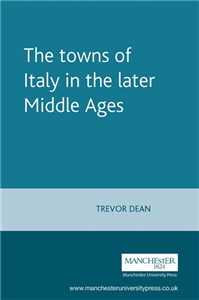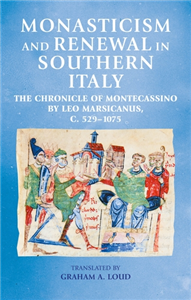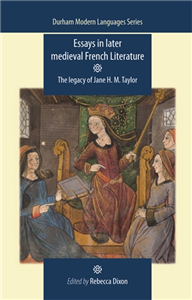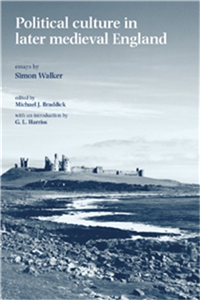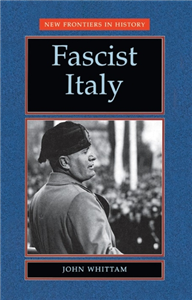Your Search Results
-
Promoted ContentLiterature & Literary StudiesJanuary 2013
The towns of Italy in the later Middle Ages
by Trevor Dean
The towns of Italy in the later middle ages presents over one hundred fascinating documents, carefully selected and coordinated from the richest, most innovative and most documented society of the European Middle Ages. No other English language sourcebook has the same geographical or chronological range. This collection is carefully structured around the crisis of the fourteenth century and arranged in contrasting groups of texts. By connecting documents in translation to recent scholarship and debates, it addresses five key areas of medieval urban history: the physical environment, civic religion, economy, society and politics. Offers students well-translated and effectively contextualised documents along with some guidance to the secondary work of Italian scholars which is largely inaccessible to undergraduate students.
-
Promoted ContentHumanities & Social SciencesNovember 2023
Rethinking Norman Italy
Studies in honour of Graham A. Loud
by Joanna Drell, Paul Oldfield
This volume on Norman Italy (southern Italy and Sicily, c. 1000-1200) honours and reflects the pioneering scholarship of Graham A. Loud. An international group of scholars reassesses and recasts the paradigm by which Norman Italy has been conventionally understood, addressing varied subjects across four key themes: historiographies, identities and communities, religion and Church, and conquest. The chapters revise and refine our understanding of Norman Italy in the eleventh and twelfth centuries, demonstrating that it was not just a parochial Norman or Mediterranean entity but also an integral player in the medieval mainstream.
-
 Trusted Partner
Literature & Literary StudiesMay 2000
Trusted Partner
Literature & Literary StudiesMay 2000The towns of Italy in the later Middle Ages
by Rosemary Horrox, Trevor Dean, Simon Maclean
The towns of Italy in the later middle ages presents over one hundred fascinating documents, carefully selected and coordinated from the richest, most innovative and most documented society of the European Middle Ages. No other English language sourcebook has the same geographical or chronological range. This collection is carefully structured around the crisis of the fourteenth century and arranged in contrasting groups of texts. By connecting documents in translation to recent scholarship and debates, it addresses five key areas of medieval urban history: the physical environment, civic religion, economy, society and politics. Offers students well-translated and effectively contextualised documents along with some guidance to the secondary work of Italian scholars which is largely inaccessible to undergraduate students. ;
-
 Trusted Partner
Humanities & Social SciencesFebruary 2026
Trusted Partner
Humanities & Social SciencesFebruary 2026Monasticism and renewal in southern Italy
The Chronicle of Montecassino by Leo Marsicanus, c. 529–1075
by Graham Loud
The chronicle of Leo Marsicanus recounts the history of the abbey of Montecassino from its foundation by St. Benedict in the sixth-century up to 1075. It presents a detailed and compelling story of tribulation and renewal, with the abbey twice destroyed and abandoned in the early Middle Ages and then rebuilt. It concludes with an informative account of the building and dedication of the new abbey church by Abbot Desiderius in 1066-71. The chronicle is also a key source for the more general history of southern Italy in the early Middle Ages, and of the conquest of the region by the Normans during the eleventh century. In addition, Montecassino was one of the great intellectual centres of western Christendom and a major contributor to the reform movement within the Church during the later eleventh century. Leo's chronicle is a crucial witness to that role.
-
 Trusted Partner
2024
Trusted Partner
2024My Italy with Berlusconi
And what has become of it. Essays, conversations, reports
by Michaela Namuth
The political era of media entrepreneur and multi-billionaire Silvio Berlusconi began in 1994. German journalist Michaela Namuth also arrived in Rome at that time. He became prime minister, she became a freelance correspondent for various newspapers. She spent the long period of his government with him. During this time, the populist Berlusconi not only paved the way for a far-right government, he was also an ice-breaker for other right-wing populists in Europe and elsewhere. What else happened during and after Berlusconi's time in power is told in 20 chapters of articles, reports and interviews. The result is a colourful mosaic of contemporary Italy. It is about publishing, design, crime fiction, the mafia, a women's factory, the south and Nutella. Under Berlusconi, the country has changed. Many speak of “Berlusconisation”, by which they mean the gradual weakening of democracy. It is a critical book, but also a declaration of love to a contradictory country whose name still has a special ring to many ears.
-
 Trusted Partner
Literature & Literary StudiesJanuary 2013
Trusted Partner
Literature & Literary StudiesJanuary 2013Popular protest in late-medieval Europe
Italy, France and Flanders
by Samuel Kline Cohn
The documents in this stimulating volume span from 1245 to 1424 but focus on the 'contagion of rebellion' from 1355 to 1382 that followed in the wake of the plague. They comprise a diversity of sources and cover a variety of forms of popular protest in different social, political and economic settings. Their authors range across a wide political and intellectual horizon and include revolutionaries, the artistocracy, merchants and representatives from the church. They tell gripping and often gruesome stories of personal and collective violence, anguish, anger, terror, bravery, and foolishness. Of over 200 documents presented here, most have been translated into English for the first time, providing students and scholars with a new opportunity to compare social movements across Europe over two centuries, allowing a re-evaluation of pre-industrial revolts, the Black Death and its consequences for political culture and action. This book will be essential reading for those seeking to better understand popular attitudes and protest in medieval Europe.
-
 Trusted Partner
Literature & Literary StudiesFebruary 2010
Trusted Partner
Literature & Literary StudiesFebruary 2010Essays in later medieval French literature
The legacy of Jane H. M. Taylor
by Mike Thompson, Rebecca Dixon
Over the course of a career spanning five decades, Jane Taylor has shown a commitment to the rehabilitation of the more neglected aspects of later medieval French literature. This volume brings together original contributions from scholars who have worked alongside Taylor and directly or indirectly benefitted from her example. The chapters demonstrate their authors' link to this legacy, and concomitantly underline the vibrancy and breadth of approach which is the hallmark of current later medieval studies. The essays in the collection centre on a number of key issues in the field: notions of literary self-consciousness and what it means to come after an avatar; issues of intertextuality and the appeal to past models in the creation of a new literary aesthetic (or a new literary criticism); and interdisciplinary questions of translation, reworking, and continuation. Essays in later medieval French literature seeks not only to illustrate the buoyant state of later medieval French literary studies but also, in so doing, to show how in broader terms responding to the legacy of an illustrious predecessor has not pejorative but positive consequences. ;
-
 Trusted Partner
Humanities & Social SciencesJanuary 2013
Trusted Partner
Humanities & Social SciencesJanuary 2013Crime, Law and Society in the Later Middle Ages
by Anthony Musson, Edward Powell
This book provides an accessible collection of translated legal sources through which the exploits of criminals and developments in the English criminal justice system (c.1215-1485) can be studied. Drawing on the wealth of archival material and an array of contemporary literary texts, it guides readers towards an understanding of prevailing notions of law and justice and expectations of the law and legal institutions. Tensions are shown emerging between theoretical ideals of justice and the practical realities of administering the law during an era profoundly affected by periodic bouts of war, political in-fighting, social dislocation and economic disaster. Introductions and notes provide both the specific and wider legal, social and political contexts in addition to offering an overview of the existing secondary literature and historiographical trends. This collection affords a valuable insight into the character of medieval governance as well as revealing the complex nexus of interests, attitudes and relationships prevailing in society during the later Middle Ages.
-
 Trusted Partner
Humanities & Social SciencesNovember 2025
Trusted Partner
Humanities & Social SciencesNovember 2025Law, society and political culture in late medieval and Reformation Germany
by Duncan Hardy
-
 Trusted Partner
The ArtsJanuary 2019
Trusted Partner
The ArtsJanuary 2019Cinema - Italy
by Stefania Parigi, Des O'Rawe
A journey to the Italian cinema that overturns established views and opens up new perspectives and interpretations. Its itinerary is organized in four stages. The first is an analysis of the theories of Cesare Zavattini on neorealism which overturns widely accepted positions both on Zavattini and on neorealism. The second confronts a key film of the post-war Italian cinema, Roberto Rossellini's Paisà, by examining the nature of its realism. The third is dedicated to Luchino Visconti: to questions of the use of language exemplified in his La terra trema, the use of settings, costume and light as agents of meaning in his Il Gattopardo and Vaghe stelle dell'Orsa. The final voyage of the film is to the physical and symbolic construction of heaven and earth in the work of Pasolini. Particular attention is given to the representation of the body in his last four films: the grotesque and mythical bodies in popular tradition in his Trilogia di vita and the tortured bodies destroyed by the mass media in Salò.
-
 Trusted Partner
Humanities & Social SciencesJune 2021
Trusted Partner
Humanities & Social SciencesJune 2021Rethinking Norman Italy
by Joanna Drell, Paul Oldfield, C. E. Beneš
-
 Trusted Partner
Humanities & Social SciencesAugust 2006
Trusted Partner
Humanities & Social SciencesAugust 2006Political culture in later medieval England
Essays by Simon Walker
by Mike Braddick
This is an important collection of pioneering essays penned by the late Simon Walker, a highly respected historian of late medieval England. One of the finest scholars of his generation, Walker's writing is lucid, inspirational, and has permanently enriched our understanding of the period. The eleven essays featured here examine themes such as kingship, lordship, warfare and sanctity. There are specific studies on subjects such as the changing fortunes of the family of Sir Richard Abberbury; Yorkshire's Justices of the Peace; the service of medieval man-at-arms, Janico Dartasso; Richard II's views on kingship, political saints, and an investigation of rumour, sedition and popular protest in the reign of Henry IV. An introduction by G.L. Harriss looks back across Walker's career, and discusses the historiographical context of his work. Both the new and previously published pieces here will be essential reading for those working on the late medieval period. ;
-
 Trusted Partner
Humanities & Social SciencesJanuary 2020
Trusted Partner
Humanities & Social SciencesJanuary 2020Political culture in later medieval England
Essays by Simon Walker
by Michael J. Braddick
This is an important collection of pioneering essays penned by the late Simon Walker, a highly respected historian of late medieval England. One of the finest scholars of his generation, Walker's writing is lucid, inspirational, and has permanently enriched our understanding of the period. The eleven essays featured here examine themes such as kingship, lordship, warfare and sanctity. There are specific studies on subjects such as the changing fortunes of the family of Sir Richard Abberbury; Yorkshire's Justices of the Peace; the service of medieval man-at-arms, Janico Dartasso; Richard II's views on kingship, political saints, and an investigation of rumour, sedition and popular protest in the reign of Henry IV. An introduction by G.L. Harriss looks back across Walker's career, and discusses the historiographical context of his work. Both the new and previously published pieces here will be essential reading for those working on the late medieval period.
-
 Trusted Partner
Trusted Partner
-
 Trusted Partner
Literature & Literary StudiesOctober 2010
Trusted Partner
Literature & Literary StudiesOctober 2010Sanctity and pornography in medieval culture
On the verge
by Bill Burgwinkle, Cary Howie, Anke Bernau
Sanctity and pornography in medieval culture exposes the complexity of bodily exposure in medieval devotion and contemporary pornographic cultures. Through readings of texts and images, sacred and profane, from preimodern France and Italy as well as Anglo-American modernity, the book makes a case for paying closer attention to the surfaces of our bodies and the desires that those surfaces can articulate and arouse. From the Old French life of Saint Alexis to the work of writer-filmmaker Miranda July, from Wakefield Poole to Pietro Aretino, these are texts and images that diminish the distance between premodern Europe and contemporary California, between the sacred and the profane, as they demonstrate how, in the end as in the beginning, the surface of things is never simple. ;
-
 Trusted Partner
Trusted Partner
-
 Trusted Partner
The ArtsJune 2021
Trusted Partner
The ArtsJune 2021Medieval film
by Anke Bernau, Bettina Bildhauer
Medieval film explores theoretical questions about the ideological, artistic, emotional and financial investments inhering in cinematic renditions of the medieval period. What does it mean to create and watch a 'medieval film'? What is a medieval film and why are they successful? This is the first work that attempts to answer these questions, drawing, for instance, on film theory, postcolonial theory, cultural studies and the growing body of work on medievalism. Contributors investigate British, German, Italian, Australian, French, Swedish and American film, exploring topics such translation, temporality, film noir, framing and period film - and find the medieval lurking in inexpected corners. In addition it provides in-depth studies of individual films from different countries including The Birth of a Nation to Nosferatu, and Robin Hood: Prince of Thieves. Medieval Film will be of interest to medievalists working in disciplines including literature, history, to scholars working on film and in cultural studies. It will also be of interest to undergraduates, postgraduates and to an informed enthusiast in film or/and medieval culture.
-
 Trusted Partner
The ArtsJanuary 2019
Trusted Partner
The ArtsJanuary 2019Medieval film
by Anke Bernau, Bettina Bildhauer
Medieval film explores theoretical questions about the ideological, artistic, emotional and financial investments inhering in cinematic renditions of the medieval period. What does it mean to create and watch a 'medieval film'? What is a medieval film and why are they successful? This is the first work that attempts to answer these questions, drawing, for instance, on film theory, postcolonial theory, cultural studies and the growing body of work on medievalism. Contributors investigate British, German, Italian, Australian, French, Swedish and American film, exploring topics such translation, temporality, film noir, framing and period film - and find the medieval lurking in unexpected corners. In addition it provides in-depth studies of individual films from different countries including The Birth of a Nation to Nosferatu, and Robin Hood: Prince of Thieves. Medieval film will be of interest to medievalists working in disciplines including literature, history, art history, to scholars working on film and in cultural studies. It will also be of interest to undergraduates, postgraduates and to an informed enthusiast in film or/and medieval culture.
-
 Trusted Partner
Literature & Literary StudiesNovember 2019
Trusted Partner
Literature & Literary StudiesNovember 2019Household knowledges in late-medieval England and France
by Glenn D. Burger, Rory G. Critten, Anke Bernau
-
 Trusted Partner
Humanities & Social SciencesJuly 1995
Trusted Partner
Humanities & Social SciencesJuly 1995Fascist Italy
by John Whittam
Fascist Italy is a concise introduction to the phenomenon of Italian fascism and its impact. The author balances an up-to-date re-evaluation of political, diplomatic and military developments with a full assessment of the more neglected domestic and cultural dimensions of the subject. With the aid of documents and recent research on the subject, this book presents an analysis of the origins of the movement, the reasons behind its political success and the methods used to construct and consolidate a regime capable of resolving the problems of mass society in the 20th century. Within his broad-ranging analysis, Whittam places particular emphasis on the attempts to exert social control, the interaction of party and state, the tension between revolutionary and conservative tendencies and on the role of Il Duce. Mussolini's triumphs and failures in peace and war and his ultimate responsibility for the disintegration of the regime are discussed objectively. ;






